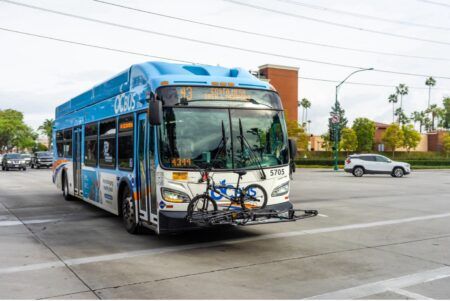One of the USA’s leading suppliers of applied informatics systems for the transportation industry, Iteris Inc., has received another major transit signal priority system project in Southern California.
Iteris has announced that it has been awarded a US$1.4m contract by the City of Culver City to provide a bus signal priority (BSP) system for eight Culver CityBus (CCB) lines, representing the continued expansion of its BSP technology in Los Angeles County, and Southern California overall.
Under the terms of the three-year agreement, which is extendable for two additional years of operations and maintenance service, the company will provide design services, procurement and testing, and make the new BSP system fully operational at 103 signalized intersections in Culver City.
The new project is the seventh BSP project in Southern California, bringing total deployments of Iteris’s BSP connected bus solutions to more than 600 intersections in the region. Major customers in the region include: the City of Torrance Transit, Los Angeles County Metropolitan Transportation Authority (LACMTA), Orange County Transportation Authority (OCTA), and Alameda-Contra Costa Transit.
The CCB currently operates eight lines that include a bus rapid transit line called the Rapid 6. The Culver City initiative will improve transit services for more than five million CCB riders a year, covering 33 square miles of west Los Angeles communities. Deployment of the BSP system is anticipated to be completed within 12 months. The BSP system will make use of existing on-bus systems that incorporate GPS-based automatic vehicle location equipment, wireless communications, and advanced intersection traffic controller technologies.
Iteris says the CCB deal represents its commitment to making use of the latest vehicle-to-infrastructure (V2I) technologies to improve efficiency in public transit networks across the country. The company’s BSP system is known as TransitHelper and comprises four components: Priority Request Generator; Bus to intersection communication systems; TransitHelper Processor; Central Monitoring and Reporting software platform.
The system also uses the company’s Edge Connect remote communications module to connect to traffic control cabinets, and Vantage Pegasus wireless communication units.
Currently active at more than a thousand intersections worldwide, the BSP system has confirmed results that show:
• 9% reduction in peak period round-trip bus running times;
• 23% reduction in stop times at traffic signals;
• No measurable impact on cross street vehicle delays.
“Improving safety and efficiency for all modes of transportation is a priority for us and the cities and state agencies with which we work throughout the USA,” said Ramin Massoumi, senior vice president and general manager for transportation systems at Iteris.
“This new initiative with the City of Culver City is further testament to the efficacy of our vehicle-to-infrastructure approach to mitigate traffic congestion throughout southern California metropolitan areas, as well as nationwide.”




